How weather extremes influence the stock markets
The extent of extreme weather events such as heavy rain, hurricanes and flooding is being felt by more and more people. After the initial major shock and the clean-up work, the question often arises as to how much money is available for aid and who will pay for the damage. Insurance companies play a crucial role here because they are faced with the challenge of making large payouts.

However, Hans Selleslagh, Swiss spokesman for the online broker Freedom24, knows that anyone who thinks that insurance companies are in trouble because of this is mistaken: "Studies show that although these companies record slightly negative returns after major disasters, the overall impact is less severe than some would expect." After hurricanes, for example, losses are usually less than one percent, but it depends on the severity of the natural disaster. In the 2017 hurricane season, for example, hurricanes Harvey, Irma and Maria led to losses amounting to 125 billion US dollars. While insurance stocks initially fell due to the damage payouts, the share prices of companies such as Home Depot and Lowe's, which supplied materials for reconstruction, rose significantly.
Storms on the way: Which sectors are particularly volatile?
For investors, the question of how the markets tend to behave when weather extremes are forecast is an interesting one. Selleslagh says: "The effects are usually felt quickly on the stock markets. Sectors that are closely linked to physical infrastructure, such as energy, agriculture and insurance, are usually the first to be affected by volatility. For example, if a hurricane is forecast in the Gulf of Mexico, oil prices can spike as production facilities prepare for the damage. Similarly, agricultural stocks can move when there is a risk of crop damage."
During hurricanes Harvey and Irma, for example, which significantly impacted US oil production, the volatility index rose sharply, indicating a short-term increase in investor fears. However, when damage estimates began to stabilize and turned out to be lower than expected, the S&P 500 Index quickly recovered, illustrating the complex interplay between fear on the one hand and relief about recovery on the other in market sentiment. However, because damage and adverse effects are usually not over in a few days, but on the contrary, often reverberate for a long time, they also have long-term effects on the stock markets. "Investors tend to view extreme weather events with great concern because they have a direct impact on real assets and cause problems in the long term," says the Freedom24 expert.
Curse and blessing: Which sectors offer opportunities
While no one wants severe weather and it causes a lot of suffering, the statistically higher probability of its occurrence compared to previous years is now a fact. Certain sectors are particularly relevant in connection with natural disasters, which is why there are also opportunities for investors, for example in the construction and infrastructure sector. "Companies that specialize in post-disaster reconstruction often see increased demand. For example, the construction machinery company Caterpillar usually sees an increase in orders after severe storms," explains Selleslagh. He also mentions the renewable energy sector, as well as companies working on technological solutions for smart infrastructure and early warning systems for floods and storms. And despite massive short-term payment obligations, insurance companies would also offer opportunities and experience increasing demand if, for example, they expand their range to include special natural catastrophe insurance - be it floods or crop failures after droughts.
Sustainability and ESG focus very popular with investors
In view of the frequency of extreme weather events, investors are increasingly factoring these and the resulting risks into their decisions. "Investors are increasingly looking for companies where sustainability plays an important role," says Selleslagh, adding: "Companies that meet high standards in ESG areas are often considered more resilient to the risks of climate change." Funds based on ESG criteria, such as the MSCI ESG Leaders Index, have achieved better returns than traditional market indices in recent years, Selleslagh concludes.
Source: www.freedom24.com
This article originally appeared on m-q.ch - https://www.m-q.ch/de/wie-wetterextreme-die-aktienmaerkte-beeinflussen/









